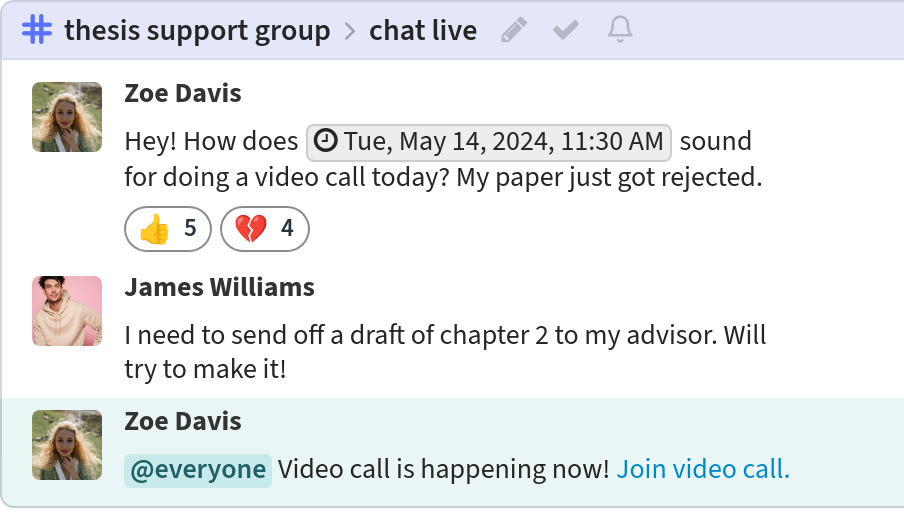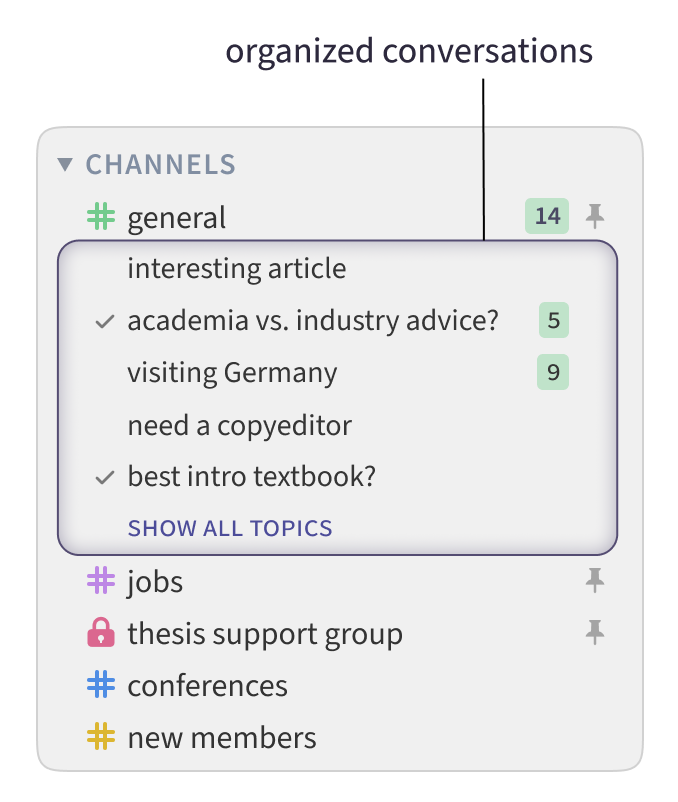Zulip connects communities of all kinds by making it easy to chat real-time or async. Why are communities choosing Zulip over Discord, WhatsApp, Slack, Facebook, and other apps you might consider? Zulip provides:
- A platform that helps community members to connect and communities to grow.
- A comprehensive moderation toolkit.
- Control over how to sign up, and a public access option.
- An open-source platform, where your data is yours.
- A free version, discounted pricing, and full sponsorships.
“The core of the Recurse Center is the community, and the core of our online community is Zulip… Switching to Zulip has turned out to be one of the best decisions we’ve made, and it’s impossible to imagine RC today without it. No other tool has a user experience that scales to a community of our size.”
— Nick Bergson-Shilcock, founder and CEO, Recurse Center; learn how the Recurse Center uses Zulip
If you're considering Zulip for an open-source project or research collaboration, check out our dedicated guides.
Encourage all community members to connect, real-time or async
When people are online at the same time, a lightweight real-time chat experience encourages active participation, and makes interactions feel more personal.

But community participants are often online only for a short while each day, or they drop by every week or two to check on what's happening. A forum-style experience makes it easier for them to participate async.
With conversations organized by topic, Zulip combines the best of both worlds.
You get seamless real-time communication, with a chronological feed of messages
in each conversation, typing notifications, presence indicators, status emoji
— everything you might expect from a modern chat experience.
At the same time, community members can read one conversation at a time, so
it's easy to circle back to a topic hours later, the next day, or next week.

“When we made the switch to @zulip a few months ago for chat, never in my wildest dreams did I imagine it was going to become the beating heart of the community, and so quickly. It's a game changer. 🧑💻🗨️👩💻”
— Dan Allen (@mojavelinux), June 29, 2021
A moderation toolkit that offers everything you need
Zulip's moderation toolkit lets you:
- Skim the combined message feed or browse conversations to find where moderator attention is needed.
- Keep discussions organized by moving conversations, or splitting them when they digress.
- Address bad behavior, for example by banning the offender and deleting their messages.
- Fight spam in an open community, for example by prohibiting disposable email addresses.
- Restrict permissions for new users.
Community members can mute anyone who's bothering them.
Delegate moderation responsibilities
Permissions in Zulip can be granted to any combination of roles, groups, and individual users, so trusted community members can help moderate. In larger communities, different people can administer different channels.
Grow your community
Lots of activity, but no chaos
On Zulip, dozens of discussions can happen in parallel, without getting in each other's way: Zulip's channels and topics create dedicated spaces for each conversation.
Participants can ask a question or kick off a new discussion without having to worry about interrupting.
“Zulip helped the FHIR community grow from a tiny group of dreamers to 500 active users sending 6000 messages per month, all driving the creation of better healthcare standards. Zulip’s topic-based threading helps us manage simultaneous discussions with clarity, ensuring the right people can pay attention to the right messages. This makes our large-group discussion far more manageable than what we’ve experienced with Skype and Slack.”
— Grahame Grieve, founder, FHIR health care standards body
Occasional participants welcome
Community members often have just a bit of time to participate, and folks with the deepest expertise might also be the most busy. To stay connected with your group, they need to quickly discover conversations that are interesting to them when they drop by.
With traditional chat tools like Discord or WhatsApp, occasional participants usually skim just the last few messages. If those messages don't spark interest, they'll bounce for the day, and eventually stop coming by altogether.
Zulip's list of recent conversations offers a quick overview of what's been happening in your community. It's easy to scan the list of topics to find which ones you want to dive into.
“I had never engaged with the Changelog podcast community in Slack because I always got too overwhelmed with the linear flow of conversations. Topic based systems are such a fresh breath of air.”
— Siddhartha Golu, Changelog community member
Many ways to participate
You can use Zulip from the browser, a desktop app, and Android and iOS mobile devices. If you prefer a Terminal app or just want to use it from your email, you can do that too.
Zulip's apps offer lots of ways to customize your experience, including dark and light themes, flexible font size and line spacing, configurable notification options, and much more. There are convenient keyboard shortcuts for all the common actions.
Zulip's UI is translated into over two dozen languages.
As public as you want it to be
Your community can require an invitation to join, or you can allow anyone to create an account. You can use:
- Private channels for conversations only some community members should have access to (e.g., discussions among organizers).
- Public channels for conversations all community members can see.
- Web-public channels for discussions anyone on the internet should be able to read without logging in. Posting always requires log in.
Open-source platform, where your data is yours
Zulip is 100% open-source software, so you always know what you're running. There are no ads, and we don't sell your data, or feed it to AI models.
If you're looking for a simple, reliable SaaS solution, it only takes a minute to sign up for Zulip Cloud. It's professionally operated and is always up to date with the latest features.
For full control over your data, follow our simple installation instructions to host Zulip yourself. If you like, you can develop custom integrations and features. If your needs change, you can always move from self-hosting to Zulip Cloud or the other way.
"We just moved the Lichess team (~100 persons) to @zulip, and I'm loving it. The topics in particular make it vastly superior to slack & discord, when it comes to dealing with many conversations. Zulip is also open-source!"
Free version, discounted pricing, and full sponsorships available
We sponsor over 1,500 organizations, and most non-business uses of Zulip are eligible for discounted pricing or full sponsorship.
-
Zulip Cloud: Many communities that are working towards the public good are eligible for a fully sponsored Zulip Cloud Standard plan. Other community groups pay a highly discounted rate, or use Zulip Cloud Free. Learn more.
-
Self-hosting: Communities and personal organizations (clubs, groups of friends, volunteer groups, etc.) are eligible for our Community plan for self-hosted organizations.
Other apps you might consider
We’ve talked to hundreds of people about their experiences with community chat. Here are some reasons why folks choose Zulip over other apps you might consider for hosting your community.
“Zulip makes all my Slack and Discord communities feel tedious by comparison.”
— AJ Kerrigan, Changelog community member
Group chat apps (WhatsApp, Telegram, Signal, Messenger, etc.)
Group chat apps can be convenient for small or low-activity groups, but managing an active community quickly becomes unwieldy. Having more than one conversation at a time in a single group chat feels chaotic, and membership management is a big pain if you try to solve that by using several group chats.
Discord
In Discord, only the latest messages are easy to read and reply to. Many less frequent participants will miss much of what's happening in an active community.
You're also subjecting community members to intrusive in-app advertising, even if they purchase Discord's paid plans.
Slack
Like Discord, Slack doesn't work well for less frequent participants in an active community. Additionally, on Slack's free plan, messages are hidden after 90 days, and are permanently deleted after a year. Slack's paid plans are generally unaffordable for community use.
On Facebook, your relationship with your community is mediated by algorithms: even replies to a user's own post are by default resorted and partially hidden from them. From Meta's perspective, advertisers are the customers, and your attention is the product being sold.
“I highly recommend Zulip to other communities… Slack is a no-go for many due to not being FLOSS, and I’m concerned about vendor lock-in if they were to stop being so generous. Slack’s threading model is much worse than Zulip’s IMO. The channels/topics flow is an incredibly intuitive way to keep track of everything that is going on.”
— RJ Ryan, Mixxx Developer